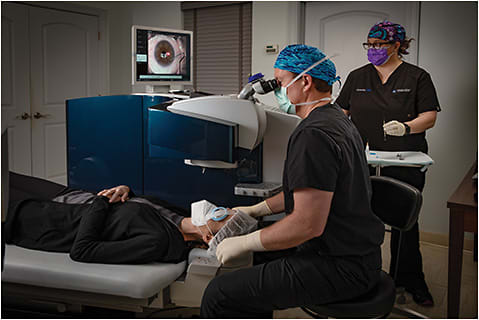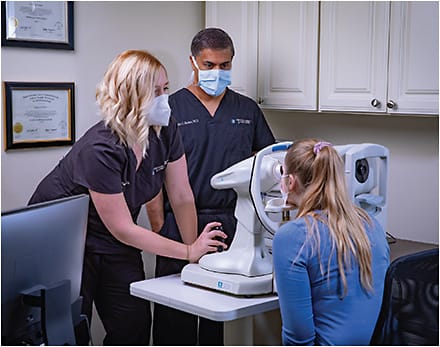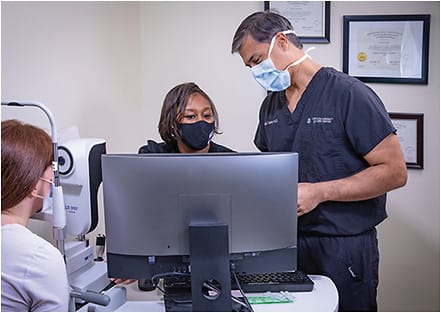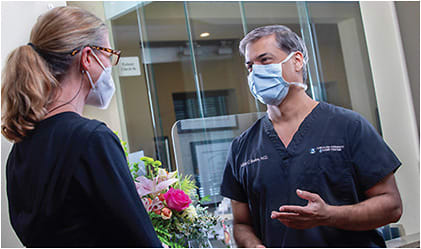Photography by Mark Staff Photo
In October, Ashlie Barefoot, JD, MBA, COE, practice administrator at Carolina Cataract & Laser Center, headquartered in Ladson, SC, says she felt she could finally breathe a sigh of relief. The multi-location, high-volume cataract practice, for which she oversees practice operations, seemed to have “completely recovered” from the hardship of the COVID-19 pandemic. Patient volume had returned, many staff let go early on were re-hired, and additional staff were employed. But a comment she overheard from a new hire revealed all was not back to normal.
“I can’t remember exactly what was said, but it was along the lines of there was a feeling of the staff being the ‘new hires’ vs. the ‘old hires,’ and that was never an issue before,” she explains. “That conversation made me realize there was a cultural disconnect among staff, as the practice has always prided itself as being ‘one family,’ whose mission is to also treat patients as family.”


Realizing the social constraints of the COVID-19 pandemic were the culprit, Ms. Barefoot and the practice’s staff set about recapturing the culture that she says distinguishes Carolina Cataract & Laser Center.
Here, staff discuss the steps they have taken thus far to achieve this.
Create practice staff ambassadors
Ms. Barefoot says one way the practice has been able to revive its culture is by having long-standing team leaders rotate amongst staff for one-on-one coaching.
“I challenged the team leaders to carve out time each week for this, so they would have the opportunity to spend time with new staff members on a one-on-one basis and get to know them on a personal level: ask about their family, where they grew up, their children, and how their day was going,” she offers. “The leaders act as the practice staff ambassadors for the new hires.”

Sarah Monson, COA, Carolina Cataract & Laser Center’s surgery scheduler, who also fills in as a tech, notes that the new approach also has helped facilitate learning the different testing devices, such as the Lenstar (Haag-Streit USA) and IOL Master (Zeiss).
“Before the pandemic, staff would kind of pile into one room to learn a new piece of equipment,” she explains. “Now, that training tends to be one-on-one.”
Give new hires gift boxes
Another way the staff at Carolina Cataract & Laser Center has been able to recover its culture is to give new hires “welcome gift boxes,” says Amanda Utsey, COA, one of the practice’s senior techs.
“The box contains a card that has current staff members’ signatures and a practice logo-emblazoned notebook and pens to encourage them to take notes while they learn,” she says.
Promote outdoor lunches
The staff at Carolina Cataract & Laser Center also has promoted outdoor lunches, moving lunchroom tables outside to invite staff bonding at a distance, says Dr. Millin C. Budev, one of the practice’s managing partners.
“We’re a busy practice, so there’s not a lot of time to talk among ourselves,” he offers. “Our lunchroom allowed us to share meals, chat, and get to know one another, which fosters staff bonding and, therefore, excellent patient care. When we shut the lunchroom down, it seemed to cement this feeling of isolation we had all been experiencing in the clinic, and isolation is completely antithetical to the practice. Now, staff is back to socializing, but safely.”
Dr. Budev adds that when it became clear a holiday party wouldn’t be possible, the practice surprised the staff with a food truck, and they celebrated safely outside.
Hold staff meetings outside
Carolina Cataract & Laser Center pivoted, so staff could continue to get together to be educated on new practice happenings, procedures, products, treatments, and devices, by moving staff meetings to the practice’s parking lot, off hours. Specifically, a whiteboard was set up, and staff brought their own chairs outside and socially distanced, says Dr. Budev.
These interactions allow us to continue educating staff on recent advancements, while allowing us to continue using heightened safety precautions, he says.
“Regarding cataract, we’ve discussed the recent developments in IOL options and patient candidacy and implants, such as Dextenza (dexamethasone ophthalmic insert, Ocular Therapeutix), used at the conclusion of surgery,” Dr. Budev says. “Having staff meetings outside lets us still get together, give people some CE hours, and also improve ourselves with regard to patient care.”
Incidentally, the practice offers IOLs such as AcrySof IQ PanOptix (Alcon), TECNIS Symfony IOL (Johnson & Johnson), and AcrySof IQ Toric IOL (Alcon).
Run a holiday gift exchange
Another way the practice was able to get staff well acquainted with one another was through running a holiday gift exchange, notes Dr. Budev.
“As part of Secret Santa, we had to get to know our person and say some things about that person that nobody else in the practice knew,” he offers. “I was assigned a new hire, who told me all about her pet bird.”
Provide exceptional patient care, safely
Carolina Cataract & Laser Center also has been capable of reinstating its “one family” culture by providing exceptional patient care, safely, says Ms. Monson.
“We offer telemedicine visits, as many other practices do, but we also provide instructions, along with screen shots of the platform, via email to either the patient or their caregiver, to ease the process,” she assures. “Additionally, we call right before the telemedicine visit to ensure the patient is all set to go. If the patient isn’t able to make it work on their device, we do a telephone call with them. We want our patients to know that we care about both their eye health and their comfort regardless of outside forces.”
Dana Miller, the practice’s patient care specialist, who oversees registration at the front desk, says front desk staff has taken the time to assuage patient fears about entering the practice by discussing Carolina Cataract & Laser Center’s safety protocols and what the patient’s journey throughout the practice will entail.
She adds the practice also has installed an intuitive patient check-in kiosk to allow for a pleasant check-in process.
“It’s not the same as having them come to the front desk, hand us their insurance cards and make small talk, but I think the device does show patients we are committed to both their comfort and safety, which I know they appreciate,” she explains.
When scheduling for surgery, Ms. Monson says, she and the staff now go above and beyond the typical pre-surgery questions to help patients understand the benefit-to-risk ratio of undergoing an elective procedure during a pandemic. “We ask whether anyone in the home is immunocompromised and whether they have family support to help them with their post-op care,” she says. “Before COVID-19, we educated patients exclusively about the risks and benefits inherent to cataract and laser surgery.”
Finally, techs take steps to keep appointments on track. For example, if masks are causing fogging on equipment, techs tape the masks down to ensure an accurate reading the first time, notes Ms. Monson.


One year later
Now, a year from the beginning of the COVID-19 pandemic, the staff at Carolina Cataract & Laser Center continue to look for new ways to both retain and promote its culture of comradery. Ms. Monson says the steps the practice has taken thus far have worked.
“This practice does such a good job of making you feel like you’re walking into your home, whether you’re a staff member or a patient,” she asserts. “We work hard to get to know our colleagues and their patients, despite the masks, among other safety requirements thrust upon us, and I’m really proud of that.” OP








